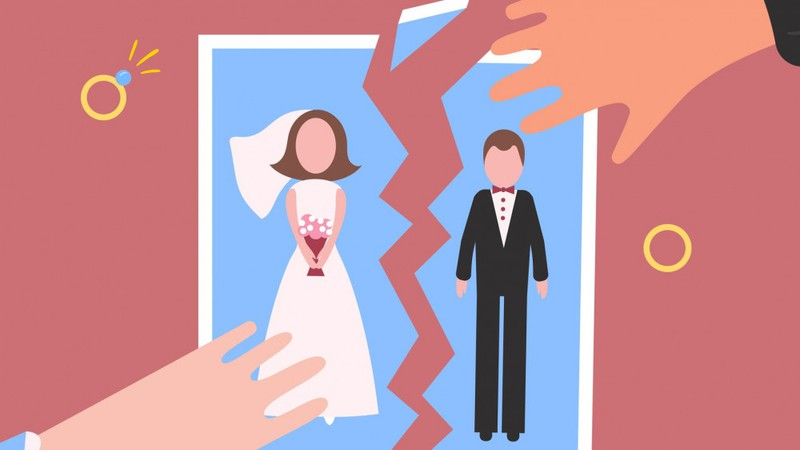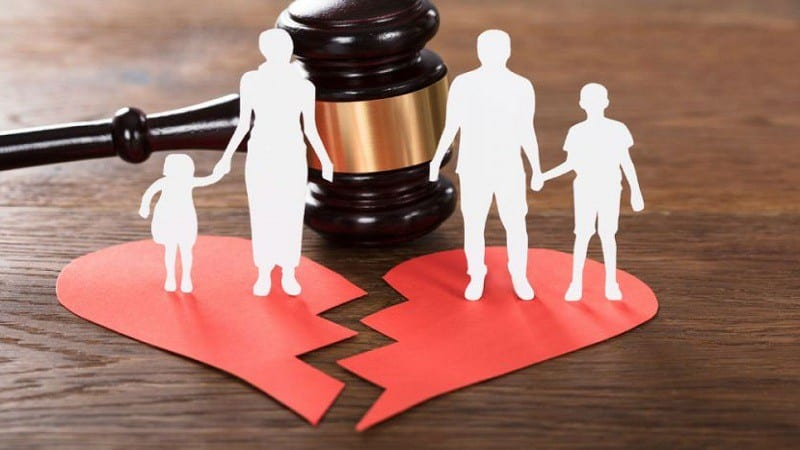Separation and divorce are undesirable in a marital relationship. However, when a couple no longer shares the same vision and purpose in their marriage, separation and divorce become considerations.
1. General Provisions of the Law on Separation
Separation means that a couple lives together or apart but does not have a marital relationship (sexual relations) but still maintains their legal marital status.
Currently, Vietnamese law does not have specific provisions on separation for several reasons. One reason is that the court cannot intervene in a couple’s relationship unless they intend to divorce. If spouses feel that their marriage has reached a deadlock, they may decide to go to court to give each other time to think, which would likely lead to a quicker decision to divorce.
Therefore, Vietnamese law has rejected the institution of separation during the development of the 2014 Marriage and Family Law.
 General Provisions of the Law on Separation
General Provisions of the Law on Separation
2. How is the Separation Procedure Expressed?
 Vietnamese Law does not have Specific Provisions on Separation
Vietnamese Law does not have Specific Provisions on Separation
Since Vietnamese law does not have specific provisions on separation, there are no separation procedures. Typically, to indicate a state of separation, couples do not live together but still maintain their legal marital relationship.
3. Similarities and Differences Between Separation and Divorce
 Similarities Between Divorce and Separation
Similarities Between Divorce and Separation
Similarities:
- Both divorce and separation indicate that the couple no longer lives together, does not share finances, and does not share a spiritual life.
Differences:
- Separation does not require any legal procedures and the marital relationship is not terminated.
- Divorce requires legal procedures to terminate the marital relationship. These procedures may include asset division, child custody, and more.
4. Asset Division During Separation
In principle, separation does not terminate the legal marital relationship. Therefore, the assets of the couple during this period are still considered joint assets. The issue of asset division only arises when there is a request for divorce from one or both spouses.
Asset division during separation
5. How Long Should a Couple be Separated Before Divorce?
Typically, an appropriate period of separation before divorce is 1-2 months. However, you only need to prove that your marriage is in a severe and irreconcilable state where the purposes of marriage cannot be achieved for the authorities to proceed with the divorce.
 Appropriate Separation Period Before Divorce
Appropriate Separation Period Before Divorce
6. Some Questions About Legal Provisions on Separation and Divorce
Is joint debt considered legal when a couple divorces?
Debts incurred by the couple during the marriage to meet their joint essential needs are considered joint debts, and both spouses have the obligation to repay them when resolving the divorce.
Clarifying doubts about divorce procedures?
There is always a basis for conciliation before divorce, but it is not necessary for it to be conducted by the People’s Committee at the ward or communal level. It could be a conciliation conducted by the family, neighborhood, or women’s union, or youth union. The necessary documents to carry out the divorce procedure are…
>> See details:
Who has the right to raise the child after a divorce?
According to Article 81 of the 2014 Marriage and Family Law:
“After a divorce, parents still have the right and obligation to nurture, care for, raise, and educate their minor children, children who have reached the age of majority but have lost their civil act capacity or are unable to work and have no property to support themselves according to the provisions of this Law, the Civil Code, and other relevant laws.”
Spouses shall agree on who will directly raise the child, the obligations and rights of each party after the divorce regarding the child. If no agreement is reached, the court will decide to entrust the child to one party based on the child’s best interests in all aspects. If the child is over 7 years old, his or her wishes must be considered.
Children under 36 months of age shall be entrusted to the mother, unless the mother does not have the conditions to directly nurture, care for, raise, and educate the child or the parents have another agreement that is in the best interest of the child.
 Resolving Legal Issues Arising from Divorce
Resolving Legal Issues Arising from Divorce
How to resolve legal issues arising from divorce?
When divorcing, the legal issues that arise include:
Joint assets of the spouses: The spouses can completely agree on the division of joint property. If no agreement is reached, either party has the right to request the court to divide the property. The principle is that when dividing joint property, the separate property of each party still belongs to that party. Joint property will be divided equally, taking into account the following factors:
+ Circumstances of the family and of the spouses.
+ The contribution of each party to the creation, maintenance, and development of the joint property.
+ Protecting the legitimate interests of each party in production, business, and profession to enable them to continue working and generating income.
+ Fault of each party in violating the rights and obligations of the spouses.
Regarding the common children: Divorce only terminates the relationship between the spouses, not the relationship between the parents and the children. The rights and obligations between the parents and the children remain as stipulated in Article 81 of the 2014 Marriage and Family Law.
+ After the divorce, the parents still have the right and obligation to nurture, care for, raise, and educate their minor children, children who have reached the age of majority but have lost their civil act capacity or are unable to work and have no property to support themselves.
+ Spouses shall agree on who will directly raise the child, the obligations and rights of each party after the divorce regarding the child. If no agreement is reached, and the child is under 36 months old, the court will decide, and the principle is to entrust the child to the mother unless the mother does not have the conditions to directly nurture, care for, and educate the child, or the parents have another agreement that is in the best interest of the child.
+ The parent who does not directly raise the child must provide child support. The amount of support is agreed upon by both parties. If no agreement is reached, the court will decide, and the parent who does not directly raise the child has the right to visit the child.
The court does not consider children over 18 years old unless they are over 18 and suffer from mental or physical disabilities that prevent them from supporting themselves.
Joint debt: This is a debt incurred by an individual or organization where both spouses borrowed together or only one spouse borrowed but for the common use or benefit of the family.
+ In principle, this joint debt can be resolved by agreement between the spouses. If no agreement is reached, the court will decide upon request. Spouses have joint and several liability as stipulated in Article 27 of the 2014 Marriage and Family Law.
Is the allowance that the wife receives during the marriage considered joint property?
Separate property of the spouses is defined in Article 43 of the 2014 Marriage and Family Law as follows:
The separate property of the spouses includes property owned by each person before the marriage; property inherited or gifted specifically to one spouse during the marriage; property specifically allocated to the wife, husband, or both according to Articles 38, 39, and 40 of this Law; property for the essential needs of the wife, husband, or both; and other property stipulated by law to be the separate property of the wife, husband, or both.
Property formed from the separate property of the wife, husband, or both is also separate property. Fruits and benefits generated from separate property during the marriage shall be handled according to the provisions of Clause 1, Article 33, and Clause 1, Article 40 of this Law.
Specific guidance on other separate property of the spouses is provided in Article 11 of Decree No. 126/2014/ND-CP dated December 31, 2014, of the Government:
- Intellectual property rights according to the provisions of intellectual property law.
- Property that the wife, husband, or both establish ownership of according to the judgment or decision of the court or competent authority.
- Allowances and preferences that the wife, husband, or both receive according to the law on preferences for people with meritorious services to the revolution; other property rights attached to the person of the wife, husband, or both.”
This means that property that the wife, husband, or both acquire according to the decision of the competent authority and allowances and preferences that the wife, husband, or both receive according to the law on preferences for people with meritorious services to the revolution are the separate property of the wife, husband, or both.
Is the allowance that the wife receives during the marriage considered joint property?
Conditions for Changing the Direct Caretaker of the Child After Divorce?
To change the direct caretaker of the child after divorce, the following grounds are necessary:
- The parents have an agreement on changing the direct caretaker of the child, which is in the best interest of the child.
- The direct caretaker of the child is no longer capable of directly nurturing, caring for, raising, and educating the child.
- For children over 7 years old, their wishes must be considered.
If the husband commits adultery, does the wife have the right to request a unilateral divorce?
If the husband or wife commits adultery, the other party has the right to request a unilateral divorce according to the provisions of the 2014 Marriage and Family Law.
>> See details:
The above information on divorce and separation is hoped to be helpful to you.





































